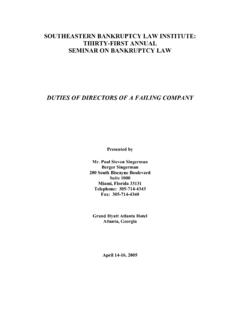Transcription of PERFECTION ISSUES UNDER REVISED ARTICLE 9
1 DB03/. PERFECTION ISSUES UNDER REVISED ARTICLE 92009 Southeastern Bankruptcy Law InstituteAtlantaApril 23-25 Barkley ClarkPartner, Stinson Morrison Hecker LLPW ashington, A portion of these materials consists of newsletter stories reprinted from Clarks' Secured Transactions Monthly, with permission of the publisher, PrattDB03/. Table of Texas Decision Requires Assignees of Motor Vehicle Contracts To Get Their Liens Noted On New Certificates of Circuit Rules That "Supergeneric" Collateral Description Can Cure Error In UCC Financing Page Name Problems .. Page Is A State's "Standard Search Logic"? .. Page Conflicts Between ARTICLE 9 And Certificate Of Title Consumer Dragnet Clauses Enforceable? ..Page In Perfecting Security Interests In IP ..Page Payment Streams From Chattel Paper: Bankruptcy To Enforce Lost Promissory Notes ..Page 3919040913_1 - 3/6/2009 9:45:27 TEXAS DECISION REQUIRES ASSIGNEES OF MOTOR VEHICLE CONTRACTS TO GET THEIR LIENS NOTED ON NEW CERTIFICATES OF TITLE Texas decision sends shock waves through the motor vehicle finance industry, particularly for securitization transactions The facts in the Texas case The assignee of the Texas security interests, Wells Fargo, relies on the "no refiling/retitling" principle governing assignments of security interests UNDER UCC ARTICLE 9 Texas bankruptcy court finds that Texas certificate of title law trumps the UCC: "may" becomes "shall" Texas court rejects UCC Comments, PEB Commentary, and other state certificate of title lawsCritique of the Texas decision The precise language of the Texas COTA makes re-titling optional rather than mandatory The UCC notice filing principle applies to certificates of title Conflict between the Texas COTA and ARTICLE 9 of the UCC?
2 The Texas COTA provision UNDER which the UCC trumps the COTA in cases of conflict29040913_1 - 3/6/2009 9:45:27 AM The decision stands alone Public policy implications, particularly for securitizationHow broad is the impact of the decision?39040913_1 - 3/6/2009 9:45:27 AMTEXAS COURT REQUIRES ASSIGNEES OF VEHICLE CONTRACTS TO GET THEIR LIENS NOTED ON NEW CERTIFICATES OF TITLEA recent decision from a Texas bankruptcy court has sent shock waves through the motor vehicle finance industry. The court, in a decision by Judge Leif Clark, has ruled that the Texas Certificate of Title Act (COTA) requires assignees of security interests to apply for a new title showing the name of the assignee as lienholder. Simply taking possession of the title with the name of the assignor on it is insufficient. In the absence of a new title reflecting the name of the assignee, the court held, the assignee's security interest was unperfected and the debtor-in-possession prevailed UNDER the strong-arm clause of the Bankruptcy Code.
3 In re Clark Contracting Services, Inc., 2008 WL 5459818 (Bankr. Tex. 11/28/08).The decision could have a big negative impact on motor vehicle consumer credit, particularly in Texas. It is already having a chilling effect on the securitization of motor vehicle installment contracts subject to the Texas COTA. Industry players predict that, if the decision stands, consumers will face higher lending costs and less available credit. As far as we can tell, no other court has ever construed a state certificate of title statute to impose such a re-titling requirement. Based on the language of the Texas COTA, the relationship of that statute to ARTICLE 9 of the UCC, and public policy concerns, we respectfully contend that the Texas decision is wrong. The facts in the Texas case. Because the facts are undisputed and straight-forward, the case was decided on cross-motions for summary judgment. Clark Contracting is a construction company that provides services related to the clearing and paving of land for commercial developments.
4 In late 2006 and early 2007, Clark financed the acquisition of six large pieces of construction equipment (specialized trucks), each of which was subject to the Texas COTA. The secured lender was CIT Group/Equipment Financing, Inc. Clark signed promissory notes for each piece of equipment and a Master Security Agreement covering all of the collateral. Certificates of title were issued for each truck; CIT noted its lien on each vehicle and took possession of the titles. Out of an abundance of caution, CIT also filed a UCC financing statement with the Texas secretary of state. In June 2007, Wells Fargo Equipment Finance (Wells Fargo) purchased CIT's notes and security interests, and took delivery of the six certificates of title. Relying on CIT's lien as noted on each title, Wells Fargo did not apply for new titles with its own name shown as lienholder. It felt that Texas law did not impose such a requirement. In early 2008, facing potential foreclosure actions by a number of creditors, Clark filed Chapter 11 bankruptcy, becoming a debtor-in-possession with the avoidance powers of a trustee.
5 Then, in April 2008, Clark brought an adversary proceeding against Wells Fargo seeking to avoid the six liens on the theory that, when Wells Fargo acquired CIT's secured position, it should have applied for new titles showing it (instead of CIT) as lienholder. Failure to do so, the debtor argued, meant that Wells Fargo's security interest was unperfected UNDER the Texas COTA and subject to avoidance UNDER Section 544 of the Bankruptcy Code. Clark did not dispute the "validity or enforceability of the assignment just PERFECTION of the security interest. In response, Wells Fargo argued that the 49040913_1 - 3/6/2009 9:45:27 AMTexas COTA does not require an assignee to take any additional steps to perfect liens that were already duly perfected by the assignor; instead, re-titling UNDER the Texas COTA isoptional only. Wells Fargo relies on the UCC. Wells Fargo also relied on UCC 9-310(c), which states that assignees of perfected security interests in titled vehicle enjoy the perfected status of their assignors without the need for an additional ARTICLE 9 filing.
6 Wells Fargo also cited Official Comment 4 to UCC 9-310, which emphasizes the no-retitling principle:Subsection (c) concerns assignment of a perfected security interest or agricultural lien. It provides that no filing is necessary in connection with the assignment by a secured part to an assignee in order to maintain PERFECTION as against creditors and transferees from the original , Subsection (c) applies to the assignment of a security interest perfected by compliance with a statute, regulation, or treaty UNDER Section 9-311(b), such as a certificate-of-title statute. Unless the statute expressly provides to the contrary, the security interest will remain perfected against creditors of and transferees from the original debtor, even if the assignee takes no action to cause the certificate of title to reflect the assignment or to cause its name to appear on the certificate of title. (Emphasis added.) Wells Fargo agreed that the Texas UCC defers to the Texas COTA insofar as the original secured creditor must get its lien noted on the title in order to perfect.
7 9-311(a). But, if the original security interest is perfected by lien notation, an assignment of the security interest does not affect its perfected status, and no new titling is required because the Texas COTA does not "expressly provide to the contrary." That was Wells Fargo's position. Bankruptcy court finds that Texas COTA trumps UCC. The key issue , in the court's mind, was "how the UCC and the Certificate of Title Act interact with respect to the assigned liens on motor vehicles." Finding that the TCOTA conflicts with the more lenient UCC rule, the Texas court sided with the debtor-in-possession. It ruled that Wells Fargo made a fatal mistake by electing not to record the assignments because "the Certificate of Title Act was enacted specifically to ensure that assigned liens on vehicles [subject to the statute] must be reflected on the certificates of title as a condition of continuous PERFECTION ." In the realm of motor vehicle financing, the court felt that "the UCC prescribes a completely different set of rules for than relying on a generally searchable database; the PERFECTION scheme relies on physical notation of security interests on the very document required to legally transfer a motor vehicle.
8 This scheme reflects the Act's larger purpose to assure the ability to sell vehicles without the need of enforced disclosure to the purchaser of the existence of a lien on the vehicle." In short, UNDER the certificate of title regime, third parties "are entitled to rely on what appears on the certificate of title, and look no further. Indeed there is nowhere else to look because a searchable database of filings is not publicly 59040913_1 - 3/6/2009 9:45:27 AMavailable." In the court's view, to further the purpose of the Texas COTA, it is necessary for the title to reflect the name of the current lienholder. The Texas court then turned to the precise language in of the Texas COTA. The statute lays out a procedure to document the assignment of a security interest in a titled motor vehicle:A lienholder may assign a lien recorded UNDER Section to the county assessor-collector for the assignment of the the debtor of the receipt of the completed application and fee, the amend the department's records to substitute the subsequent lienholder for the previous issue a new certificate of issuance of a certificate of recordation of the assignment.
9 The time of recordation of a lien assigned UNDER this section is considered to be the time the lien was recorded UNDER Section (Emphasis added.) UNDER this procedure, the application for a new title must be signed by the assignee and accompanied by (1) the applicable fee, (2) a copy of the assignment and (3) the original certificate of title. Wells Fargo contended that the word "may" as used in means that the procedure laid out in the statute is optional, not mandatory. If the assignee chooses to rely on the assignor's lien notation, it runs the risk of the assignor's release of its lien and sale to a bona fide purchaser, but that is a business decision. Without a release, the lien in the name of the assignor remains perfected and should stand up in bankruptcy. The Texas court rejected this argument on the ground that, if it were correct, the re-titling option would have been granted to the assignee rather than the assignor. The court also reasoned that, UNDER the statutory procedure, the assignee enjoys the benefit of relation-back PERFECTION .
10 The court summed it up this way: "Because of the importance of the correctness of the information on the certificate of title to innocent third parties acquiring the vehicle, the statute may be understood as an authorization to assign liens, provided that the parties to the assignment follow the procedures laid out there." (Emphasis the court's.)Texas court ignores UCC Comments, rejects PEB Commentary and other state certificate of title laws. In short, the court felt that the focus must be on the Texas COTA, notArticle 9 of the UCC. In fact, the court never even cited Comment 4 to 9-310. In arguing that no re-titling is required for an assignment of a security interest, Wells Fargo also relied heavily on Commentary No. 12 penned by the Permanent Editorial Board of the UCC back in 1994 and adopted as part of Comment 4 to UCC 9-310. The court acknowledged that the "general thrust of the Commentary" shows an intention by the drafters of the UCC that, when PERFECTION is governed by lien notation on a certificate of title, the COT statutes should only be read to apply to the original PERFECTION of the security interest, not assignment of a perfected security interest.










